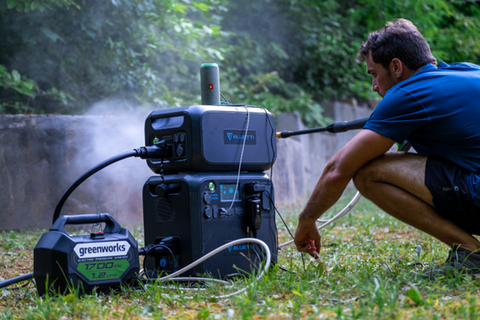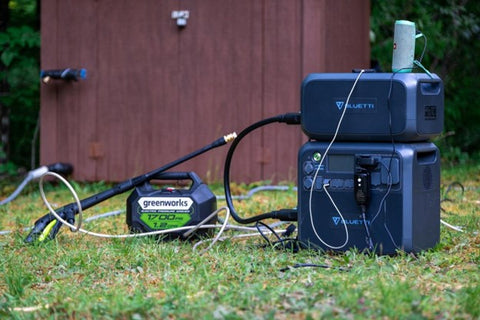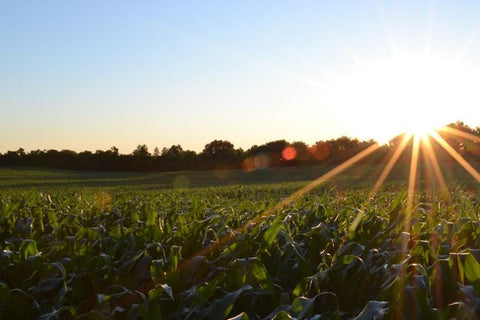The world is embarking on the quest to make farming more sustainable – and solar-powered agriculture has emerged as a promising solution in this regard. Solar-powered agriculture involves using the sun’s energy to power various farming operations. This approach to farming can not only help lower our dependence on non-renewable energy sources but also make the agriculture process more efficient.
As we grapple with climate change along with the challenge of feeding a growing global population, the agricultural sector is under huge pressure to evolve. Conventional farming methods depend upon fossil fuels for power, thereby contributing to greenhouse gases and other environmental hazards – a problem that will only grow as we attempt to scale agricultural operations to cater to the needs of almost 8 billion people currently living on this planet.
But, this tradeoff can be avoided. Many farming operations are set up in areas with abundant sunlight, placing them in pole positions to materialize the potential of solar energy for farming. It is in the wake of this realization that solar-powered farming has gained momentum in the last few years.
From irrigation systems to farm machinery, farmers can leverage this renewable resource to power every aspect of their agricultural operations. This solution is particularly attractive for remote or rural areas where grid access may be limited, unreliable, or even entirely unavailable.
Portable solar devices – portable solar panels and generators, in particular, offer a flexible and scalable solution. Farmers can easily and affordably expand their solar setup to cater to their growing power needs.
Understanding the Role of Solar Energy in Agriculture

It is impossible to fully appreciate the impact of solar-powered farming without first understanding the principles of solar power and how they apply to the agricultural sector.
Solar energy is extracted from the sun’s radiation. It is captured by the solar panels before being converted into electricity. This is an abundant and cost-effective solution for serving the power needs of various agricultural operations.
Solar Power for Farming Practices
Solar-powered farming applies these principles by using solar energy to power a number of farming practices. These practices include but are not restricted to powering machinery, heating or cooling buildings, and providing electricity for lighting.
One of the most common and effective ways in which solar power can be used in farming is for irrigation systems. Solar-powered pumps can draw water from nearby fields and distribute it across the farming fields. This will not only fulfill the crops’ water needs, but will do so while minimizing waste.
Solar Power for Controlled Environments
Another major use of solar power is in controlled environments like greenhouses. Solar power can help maintain the lighting and temperature conditions conducive to crop growth, increasing the efficiency of such environments while lowering reliance on expensive, environmentally-unfriendly conventional sources of energy.
Solar-Powered Farming in Remote Areas
As mentioned earlier, solar power can play a role in realizing the farming potential of remote regions that often have no or limited access to grid electricity. Thanks to their compact nature, portable solar panels, and generators can easily be transported to and set up in these areas, offering reliable power even in the absence of a grid.
Portable Solar Panels in Agriculture
Portable solar panels are important drivers in the move towards solar-powered farming future. The ease with which they can be transported and installed has made these panels a game-changer for modern farmers.
Portable solar generators soak up sunlight and use it to produce electricity – a vital asset powering a range of farming operations. Since they are often used outdoors and in different weather conditions, these panels are made to be durable and resistant in the face of elements. Other than that, their portability allows farmers to maximize sunlight exposure by adjusting their position throughout the day. The freedom to relocate these panels ensures a consistent power source for daily farming operations, regardless of the farm location.
Agricultural Uses of Portable Solar Panels
As discussed earlier, the most prominent agricultural use of portable solar panels involves powering irrigation systems. These panels can produce the electricity needed to power pumps and consequently bring water from wells and reservoirs onto the farming fields. This sustainable solution can prove transformative, especially in areas with abundant sunlight. Farmers in arid regions of Asia and Africa, for instance, have adopted solar-powered irrigation to great effects, increasing both crop yields and food security.
But, the farming applications of portable solar panels extend well beyond irrigation. They can be used to light barns, power dairy equipment, and operate threshers or cleaners. They can also produce electricity for farm security systems and electric fences, thereby making the farm safer and more efficient.
Challenges and Solutions
However, like with any other innovation, the integration of portable solar panels is not obstacle-free. Some of these hurdles include a relatively high initial investment and a heavy dependence on sunlight.
That said, the declining costs of portable solar panels and the prospects of long-term savings make them a worthwhile investment regardless. Besides, government incentives can further tip the scales in favor of portable solar panels. In the US, for example, the Rural Energy for America Program (REAP) is one example of initiatives offering financial assistance for solar technology, including portable solar panels.
The Role of Portable Solar Generators in Farming

Portable solar generators are the second essential tool in the solar-farming arsenal that we will be covering.
These generators are particularly critical in situations where a continuous power supply is a must. They contain battery packs, which allow them to store excess solar energy for later use, such as during the night or on overcast days when sunlight may be at a premium. Like with solar panels, their portability makes them flexible and gives farmers the freedom to set them up wherever needed.
From water pumps and lighting systems to harvesting and planting machinery, portable solar generators can power a wide array of farming equipment. Beyond equipment, they can also store and supply reliable electricity for farm buildings like barns, workshops, and on-site offices.
Since they are similar to portable solar panels in many aspects, they also come with many of the same challenges. They have considerable upfront costs and are dependent on sunny weather – although to a lesser extent than solar panels. But, their ability to store electricity and deliver consistent power regardless of sunlight certainly outweighs their drawbacks.
Scaling Up – Extending Solar Power to Larger Agricultural Operations
Earlier, we mentioned the scalability potential of portable solar power – the potential that will take center-stage in the global push towards eco-friendly farming practices. From powering heavy machinery to transforming non-arable lands into farming locations, solar power has plenty to offer for larger farming operations.
Powering Heavy Machinery
Naturally, larger farms involve the use of heavier machinery, such as tractors, cultivators, and harvesters. Until recently, these energy-intensive machines were powered using fossil fuels, making significant contributions to not just greenhouse gas emissions but also to operational costs.
With solar power, we have a much more viable alternative. By powering heavy-duty machinery using portable solar panels and generators, large-scale farms can significantly reduce their carbon footprint while also making their operations more cost-effective.
Solar Energy in Large-Scale Controlled Environments
Controlled environments like greenhouses and vertical farms are becoming increasingly common features of large-scale farming setups. From lighting conditions to temperature regulation, these environments require a large amount of consistent energy to support plant growth.
By incorporating solar power, these facilities can maintain these optimal conditions and minimize or even eliminate their dependence on conventional power sources.
Leveraging Underutilized Land for Solar Farms
Large-scale farms often have sections of land unsuitable for farming. Instead of letting these portions waste away, farmers can use the power of solar to convert them into cultivatable areas.
Solar installations can provide enough electricity to power the entire operation and, in some cases, even sell some back to the grid. This will not only expand the farming land but potentially create a new source of income for the farmers.
Beyond the Fields – The Broader Impact of Solar-Powered Farming
The transformative effects of solar farming are not confined to the fields. It has the potential to contribute to the grid, affect socio-economic dynamics, reshape rural landscapes, and mitigate climate change.
Contributing to the Grid
Solar installations on farms can feed excess energy back into the local energy grid, lowering its burden and supporting neighboring communities.
This not only presents the chance for farmers to augment their agricultural income, but also increases the percentage of renewable power in the overall energy mix, catalyzing the move towards a sustainable future.
Affecting Socio-Economic Dynamics
The impact of solar power in farming also extends to socio-economic dynamics. For example, solar energy can promote development in rural areas by supplying electrical energy for essential services like health and education.
In addition, by reducing energy expenses and increasing income potential, solar power can even improve living standards and create economic equity.
Strengthening Rural Landscapes
Solar power can significantly affect rural communities for the better. By lowering dependence on conventional power sources, farmers can achieve greater independence and, by extension, lower operational costs and higher profitability. This positive impact often extends to the wider community, creating job opportunities and strengthening the local economy.
What’s more, lower fossil fuel usage also contributes to better air quality and healthier living conditions.
Mitigating Climate Change
Currently, agriculture is a major contributor to greenhouse gas production – but solar-powered farming has the potential to change this. By lowering reliance on fossil fuels and reducing their farms’ carbon footprints, farmers can help turn the tables on climate change and global warming.
Moreover, solar-powered farms require less water for operations like irrigation, and can thus contribute to water preservation – another vital consideration in the face of water scarcity and changing climate patterns.
Reaping the Sun – Portable Solar Panels and Generators for Farming

The more we traverse the fields of solar-powered farming, the more its benefits become evident. From small-scale farming to large-scale industrial operations, solar energy in agriculture is far from a supplemental source of power. It is a promising road to significant local and global changes, including higher operational efficiencies, lower environmental impact, and an increase in economic opportunities.
So, to view solar-driven agriculture as a niche practice or the latest trend would be to grossly underestimate its long-term transformative potential spanning economic, social, and environmental realms. With more farmers turning their faces and farms towards the sun, we can hope for a future where our food-production practices align with environmental preservation and ecological balance.
There are not many ways that allow us to reap the benefits of the sun as fully as solar-powered farming does.




